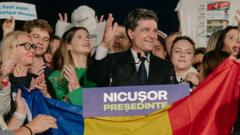In a decisive electoral match, Nicusor Dan has emerged victorious in the Romanian presidential race, thwarting the challenge from right-wing nationalist George Simion, amid tensions and a backdrop of prior electoral irregularities.
Liberal Candidate Nicusor Dan Triumphs Over Nationalist George Simion for Romanian Presidency

Liberal Candidate Nicusor Dan Triumphs Over Nationalist George Simion for Romanian Presidency
Bucharest's election sees pro-European mayor secure presidency amid national unrest and diaspora support.
In Bucharest, Romania—pro-European and liberal candidate Nicusor Dan has secured the presidency following a fiercely contested election against right-wing nationalist George Simion. Dan, the current mayor of Bucharest, captured 54% of the votes in a runoff that saw a historic turnout of over 11.6 million Romanians.
This victory comes after months of political instability, marked by the annulment of a previous presidential race due to allegations of Russian interference. George Simion, leader of the nationalist AUR party, had received a boost from anti-establishment sentiment and won an initial round thanks to significant diaspora support in key regions, including Spain and Italy.
Despite Simion’s early confidence following the first-round results, it was Dan’s campaign focused on anti-corruption and European unity that ultimately resonated more with voters. After the votes were counted, jubilant Dan supporters gathered outside City Hall, chanting his name and celebrating a collective sense of hope for Romania's future. “We need to build Romania together irrespective of who you voted for,” Dan remarked during a victory speech that emphasized inclusivity and collaboration.
The election saw a remarkable turnout, with Dan winning over six million votes. His commitment to supporting Ukraine and fighting corruption was a significant part of his platform, contrasting with Simion's more isolationist stance. As Dan celebrated his victory, he was met with a mix of relief and joy from his supporters, who expressed a desire for a change in governance and a meaningful future for the nation.
Notably, while Dan celebrated, Simion maintained hope in the wake of partial results and deflected media narratives that painted him as a far-right provocateur connected to pro-Russian sentiments. However, as reality set in during the early hours post-election, Simion conceded his defeat on social media, ending a campaign that had initially suggested a rise for nationalism in Romanian politics.
As Romania steps forward under Dan's leadership, the support from neighboring Ukraine and Moldova marked a resounding endorsement for a vision that embraces open borders and cooperation within the European framework. While Simion’s appeal to sectors of the population demanding change remains significant, the election results signal a cohesion towards a pro-European, democratic future for Romania.
This victory comes after months of political instability, marked by the annulment of a previous presidential race due to allegations of Russian interference. George Simion, leader of the nationalist AUR party, had received a boost from anti-establishment sentiment and won an initial round thanks to significant diaspora support in key regions, including Spain and Italy.
Despite Simion’s early confidence following the first-round results, it was Dan’s campaign focused on anti-corruption and European unity that ultimately resonated more with voters. After the votes were counted, jubilant Dan supporters gathered outside City Hall, chanting his name and celebrating a collective sense of hope for Romania's future. “We need to build Romania together irrespective of who you voted for,” Dan remarked during a victory speech that emphasized inclusivity and collaboration.
The election saw a remarkable turnout, with Dan winning over six million votes. His commitment to supporting Ukraine and fighting corruption was a significant part of his platform, contrasting with Simion's more isolationist stance. As Dan celebrated his victory, he was met with a mix of relief and joy from his supporters, who expressed a desire for a change in governance and a meaningful future for the nation.
Notably, while Dan celebrated, Simion maintained hope in the wake of partial results and deflected media narratives that painted him as a far-right provocateur connected to pro-Russian sentiments. However, as reality set in during the early hours post-election, Simion conceded his defeat on social media, ending a campaign that had initially suggested a rise for nationalism in Romanian politics.
As Romania steps forward under Dan's leadership, the support from neighboring Ukraine and Moldova marked a resounding endorsement for a vision that embraces open borders and cooperation within the European framework. While Simion’s appeal to sectors of the population demanding change remains significant, the election results signal a cohesion towards a pro-European, democratic future for Romania.





















